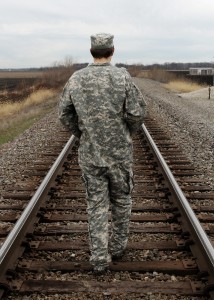 A year and a half ago, Tiffany Garcia was lost. She felt no purpose, and her service as a Marine in Iraq had left her scarred and struggling. She worked as a waitress for a while, but that didn’t fill the void that burdened her. She needed a challenge. She needed a mission.
A year and a half ago, Tiffany Garcia was lost. She felt no purpose, and her service as a Marine in Iraq had left her scarred and struggling. She worked as a waitress for a while, but that didn’t fill the void that burdened her. She needed a challenge. She needed a mission.
Upon her return home from the Marine Corps after five years of active service, Garcia found it difficult to even get out of bed in the morning. She felt disconnected from friends, family and herself. Her confidence sagged, and she was confused as to what to do with herself now that she was done serving–just like many of the soldiers who are coming home.
After hearing about Mission Continues–a non-profit organization that supports qualified post-9/11 veterans in their transition back into ‘everyday life’–Garcia applied for one of their fellowships. At the time, the Mission Continues only supplied 30 fellowships, one of which Garcia received. Now, they have the goal of giving more than 250 in 2012. When soldiers come home, they often feel they have lost their purpose. Mission Continues gives them the tools to make a change, not only for themselves, but for the community as well.
“I just think their confidence is the biggest thing that affects them coming home,” Garcia said. “I think they come home not really knowing who they are anymore, or how to use these experiences in a positive way.”
Mission Continues was founded by Eric Greitens in 2007. Returning home from his military service as a Navy SEAL in Iraq, Greitens noticed that many of the returning soldiers wanted to continue their service because civilian life was not fulfilling enough for them. Wanting to strengthen the community and the ‘new generation’, Greitens, along with two friends, founded Mission Continues.
“Our veterans are searching for some kind of purpose,” Missions Continues member Emily Rodenbeck said. “When they come back home, they are wounded or struggling with PTSD, and they get stuck inside playing video games.”
The Mission Continues started when Greitens’s mission ended. After experiencing an ambush while serving in Afghanistan, his wounded and broken troop was sent back home. Fortunately for Greitens, he wasn’t wounded. While he visited his comrades at Bethesda Hospital in Maryland, he talked. He talked with them about what their plans were. He talked with them about what they wanted. They all said the same thing.
“I just want to go back and serve with my brothers.”
Greitens realized that all his fellow soldiers just needed to be empowered. Like the thousands of soldiers who are coming home from Iraq today. Just like Garcia. In their first year, Mission Continues had a mere four fellowships. Using the capital from their disability checks, Greitens and his two friends funded the living expenses of four retired soldiers for 26 weeks, allowing them to move back into their communities and assume leadership roles there.
“That really speaks to the sense of finding that sense of purpose,” Rodenbeck said.
This is where Garcia found herself two years ago: without purpose, trudging through her life cumbersomely, waiting for fulfillment. She finally quit her job as a waitress and applied for a fellowship with the Mission Continues. She worked with them 20 hours a week for all 26 weeks of her fellowship. More importantly, though, she found new purpose. She found her niche. She had a reason to keep fighting for her lifestyle. She had a new mission.
“It’s been terrific ever since I have been here,” Garcia said.
In her role, Garcia takes applicants through the fellowship process. Her job is to provide the stability that many of these veterans lack, so they can focus on their service. Life at home, combined with the pressure of the transition from wartime to peacetime, can distract fellows, making it hard for them to accomplish what they set out to do. Garcia works to take as much pressure off of soldiers as possible.
“A lot of them feel apprehensive about going back out into the community,” Garcia said. “It’s a hard thing for them to think about. But it’s a challenge. No one said this was going to be easy.”
With the help of others like her, Garcia finished her fellowship in September of 2010. Since then, she has worked as one of the leaders of the fellowship program at the Mission Continues. As the war comes to an end, and more soldiers come home not knowing what to expect, the organization is stepping up their game to get more veterans serving in their communities again. They know that they aren’t going to be the solution to the shortage of veteran leaders in the community, but they know that the little help they do provide is beginning to have an impact on the area around them. They have helped more than 200 veterans to date, with expectations of doubling that by year’s end. They just finished a 60-day-long service event that included more than 200 projects.
“Our ultimate goal is to change the way that this nation welcomes home its veterans,” Rodenbeck. “It’s not, ‘welcome home, thanks for your service.’ It’s, ‘now what are you gonna do? Now how are you gonna serve?’”












![Banning Bitter Truths [Opinion]](https://FHNtoday.com/wp-content/uploads/2025/03/A5420F3C-5A62-4390-A0DE-112E5DAFB16D-e1743114102833-1200x1128.jpg)


